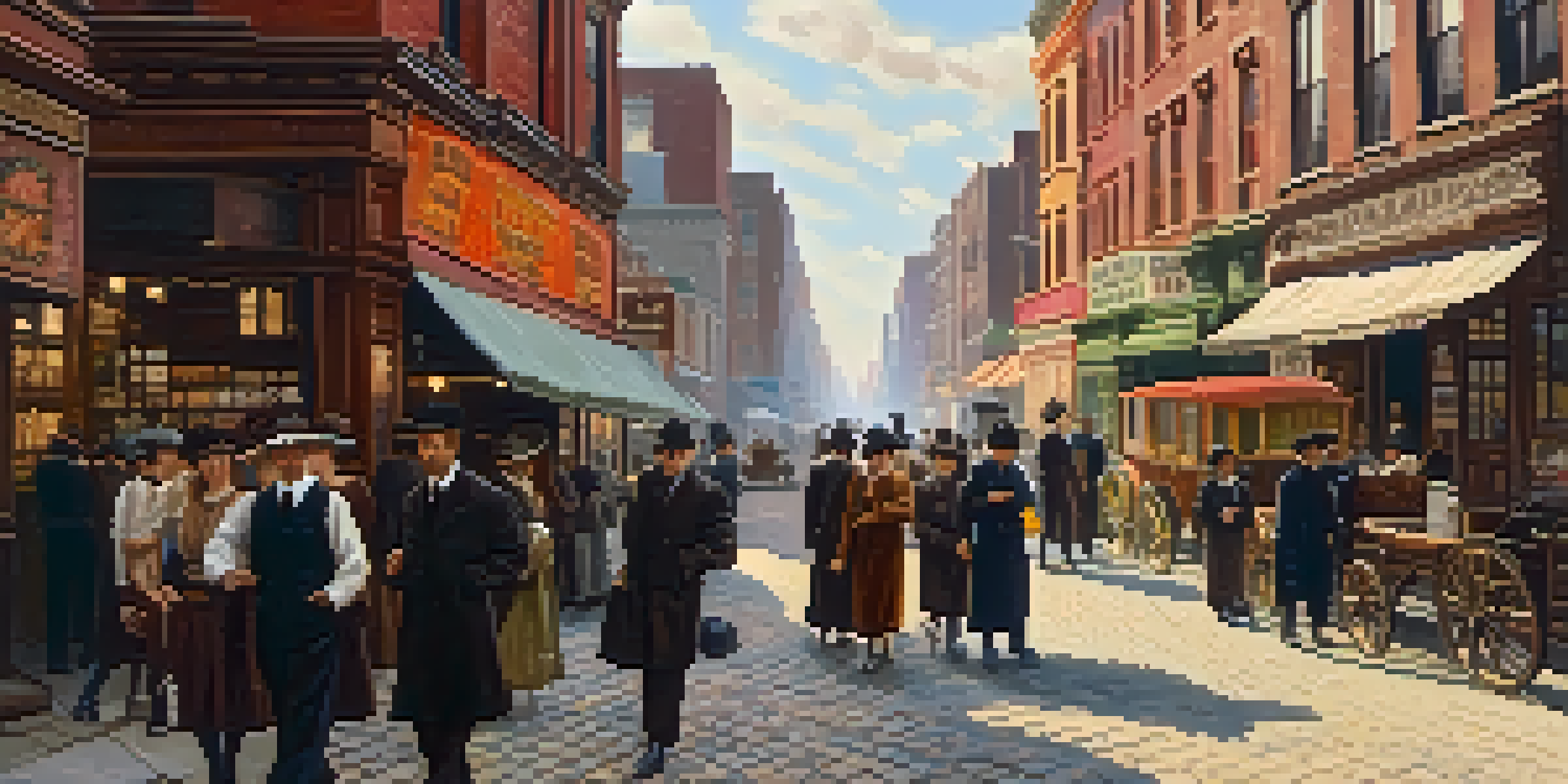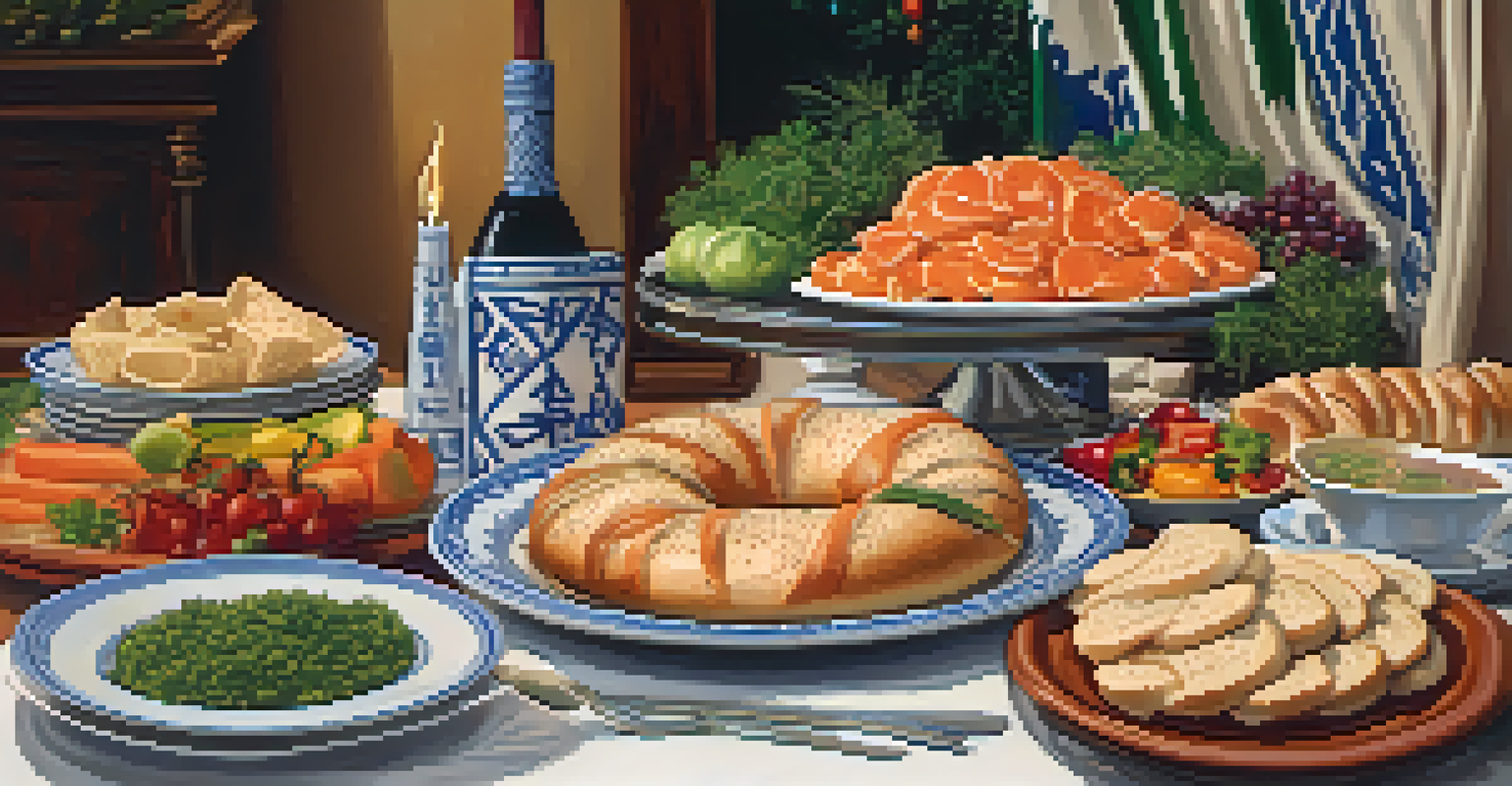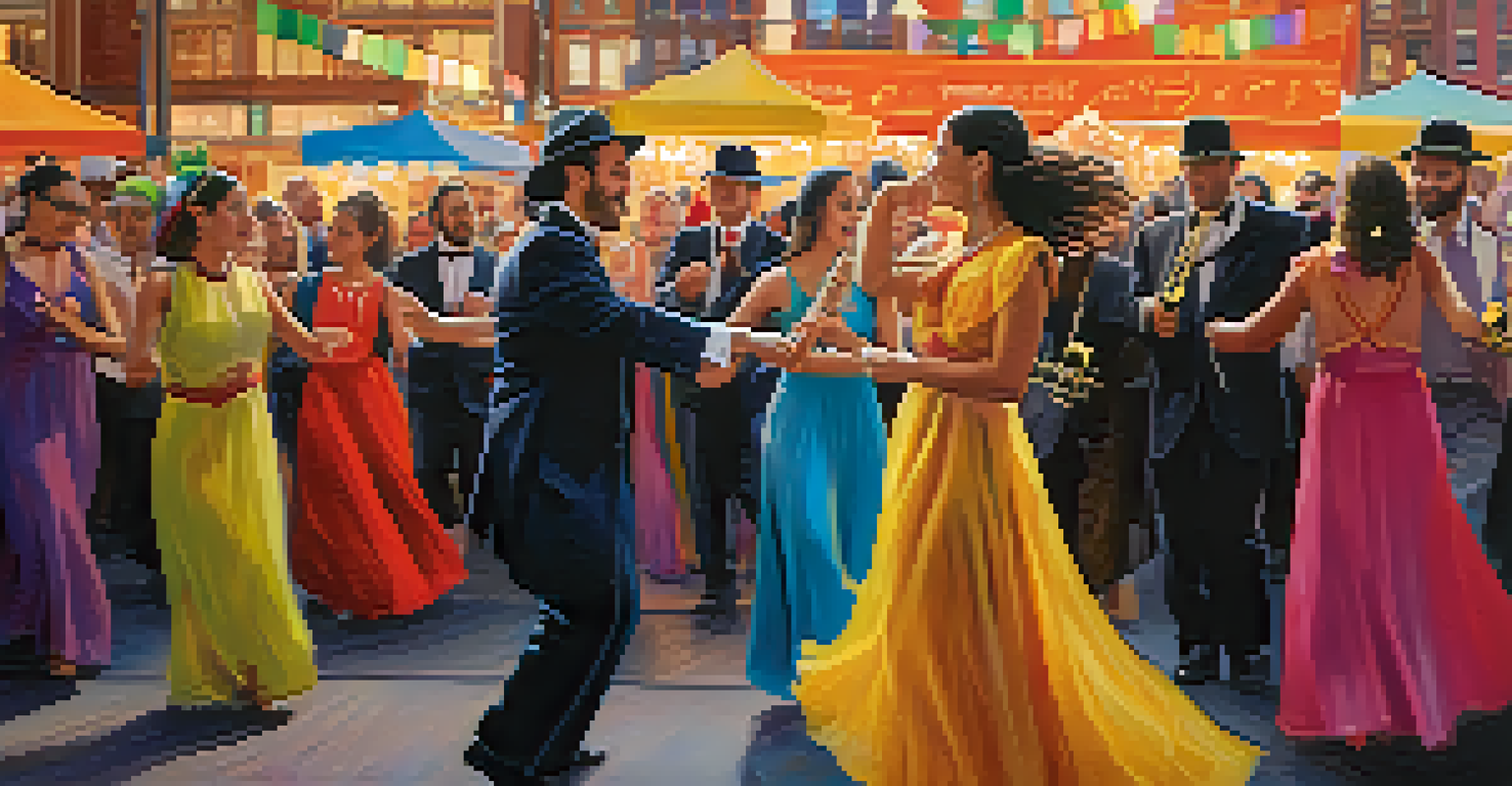The Legacy of Jewish Culture in New York City: A Historical View

The Arrival of Jewish Immigrants in NYC
The late 19th and early 20th centuries marked a significant influx of Jewish immigrants to New York City, escaping persecution in Eastern Europe. This wave of migration transformed neighborhoods, particularly in the Lower East Side, into vibrant hubs of Jewish life. Families brought with them rich traditions, languages, and culinary delights that would forever alter the cultural landscape of NYC.
A nation is not defined by its borders but by the hearts of those who call it home.
As these immigrants settled, they established synagogues, schools, and community centers that fostered a sense of belonging and support. The Yiddish language thrived in this melting pot, with theaters and newspapers serving as vital sources of entertainment and information. This cultural exchange laid the groundwork for a lasting Jewish presence in the city.
The immigrant experience was not without challenges, as many faced discrimination and poverty. However, the resilience of Jewish communities led to the formation of strong networks that provided resources for education and employment. This spirit of solidarity has continued to influence the Jewish community's role in NYC to this day.
Cultural Contributions: Art, Music, and Literature
Jewish culture has made profound contributions to the arts in New York City, with many influential artists, musicians, and writers emerging from this community. Icons like Leonard Cohen and Bob Dylan, who drew inspiration from their Jewish heritage, have shaped the music scene, resonating with audiences worldwide. Similarly, playwrights like Arthur Miller and Edward Albee have left an indelible mark on American theater.

Literature has also flourished, with Jewish authors such as Philip Roth and Saul Bellow exploring themes of identity, assimilation, and the immigrant experience. Their works have opened windows into the complexities of Jewish life, garnering critical acclaim and enriching the literary canon. This vibrant literary tradition continues to inspire new generations of writers.
Jewish Immigrants Shaped NYC Culture
The influx of Jewish immigrants in the late 19th and early 20th centuries transformed neighborhoods and enriched New York City's cultural landscape.
Visual arts have not been left behind, with the likes of Mark Rothko and Helen Frankenthaler pushing boundaries in the world of modern art. Galleries and exhibitions in NYC showcase the talents of Jewish artists, reflecting the diversity and depth of their cultural heritage. This artistic legacy remains a vital part of the city's cultural fabric.
The Role of Jewish Cuisine in NYC
Jewish cuisine has become an integral part of New York City's culinary landscape, offering a delicious glimpse into the history and traditions of the community. From bagels and lox to matzo ball soup, these dishes tell stories of migration, adaptation, and resilience. Delis like Katz's and Russ & Daughters have become iconic, attracting locals and tourists alike.
Food is our common ground, a universal experience.
Food not only nourishes the body but also serves as a means of connection among families and communities. Jewish holidays are often celebrated with special meals that bring loved ones together, reinforcing cultural bonds. These culinary traditions reflect the values of hospitality and sharing that are central to Jewish culture.
In recent years, Jewish cuisine has gained recognition beyond traditional boundaries, influencing contemporary dining trends. Chefs are experimenting with classic recipes, infusing them with global flavors while honoring their roots. This evolution of Jewish food continues to enrich New York's culinary scene, making it more diverse and exciting.
Jewish Contributions to New York's Economy
The Jewish community has played a pivotal role in shaping New York City's economy through entrepreneurship and innovation. Many Jewish immigrants started small businesses, which not only provided livelihoods for their families but also contributed to the city's growth. Over time, this entrepreneurial spirit evolved into significant contributions to various industries, including finance, real estate, and media.
Prominent figures, such as investment banker Michael Steinhardt and media mogul Barry Diller, exemplify the impact of Jewish leadership in shaping the economic landscape of NYC. Their ventures have created jobs and spurred economic development, benefiting the entire city. The legacy of Jewish entrepreneurship continues to inspire new business leaders today.
Culinary Traditions Unite Communities
Jewish cuisine, from bagels to matzo ball soup, serves as a delicious connection among families, reflecting the community's rich history and values.
Moreover, Jewish philanthropic efforts have played a crucial role in supporting community development and social services. Organizations like the UJA-Federation of New York mobilize resources to address pressing issues, ensuring that the city's diverse populations receive necessary support. This commitment to giving back reflects deeply ingrained Jewish values and continues to strengthen the fabric of New York City.
Social Justice and Advocacy within Jewish Communities
Jewish communities in New York City have a long-standing tradition of advocating for social justice and civil rights. From the early labor movements to contemporary issues, Jewish activists have often stood at the forefront of efforts to promote equality and fight discrimination. Their involvement in various social causes has made a significant impact on the city's progressive landscape.
Organizations like the Jewish Community Relations Council (JCRC) have mobilized resources to address issues such as immigration rights, racial equality, and poverty alleviation. By collaborating with diverse groups, they aim to create a more just society for everyone. This commitment to social change resonates deeply within the Jewish value system, emphasizing the importance of repairing the world.
The legacy of advocacy continues today, with younger generations embracing activism as part of their identity. Social media and grassroots movements have empowered Jewish youth to engage with pressing issues, ensuring that the community's voice remains relevant. This ongoing dedication to social justice exemplifies the enduring spirit of Jewish culture in New York City.
Jewish Religious Life and Institutions in NYC
Religious life has been a cornerstone of Jewish culture in New York City, with a rich tapestry of synagogues and religious institutions serving diverse communities. These places of worship not only provide spiritual guidance but also foster a sense of belonging and community among congregants. From Orthodox to Reform, the variety of practices reflects the dynamic nature of Jewish faith.
In addition to traditional services, many synagogues host educational programs, cultural events, and social activities that engage members of all ages. These initiatives help bridge generational gaps and ensure the transmission of Jewish values and traditions. The vibrant religious landscape of NYC continues to thrive, adapting to the needs of a changing society.
Advocacy for Social Justice Endures
Jewish communities in NYC have a strong tradition of advocating for social justice, actively engaging in civil rights movements and community support initiatives.
Moreover, interfaith dialogues and collaborations have emerged, fostering understanding and cooperation among different religious communities. These efforts highlight the importance of mutual respect and shared values, enriching the city's diverse religious fabric. The enduring presence of Jewish religious life in NYC continues to inspire spiritual growth and community connection.
The Future of Jewish Culture in New York City
As New York City evolves, so too does its Jewish culture, adapting to new realities while preserving its rich heritage. Younger generations are exploring their identity in creative ways, often blending traditional practices with modern influences. This generational shift ensures that Jewish culture remains vibrant and relevant in an ever-changing urban landscape.
Cultural institutions, such as museums and community centers, play a vital role in this evolution, offering programs that engage and educate both Jewish and non-Jewish audiences. Initiatives that celebrate Jewish history, art, and traditions help to foster appreciation and understanding among diverse populations. This cultural exchange enriches the broader community, reinforcing the importance of inclusivity.

Looking ahead, the future of Jewish culture in New York City will likely be marked by ongoing innovation and collaboration. As the city continues to attract new residents from various backgrounds, the blending of cultures will create unique opportunities for dialogue and growth. The legacy of Jewish culture will undoubtedly remain a vital part of NYC's identity for generations to come.